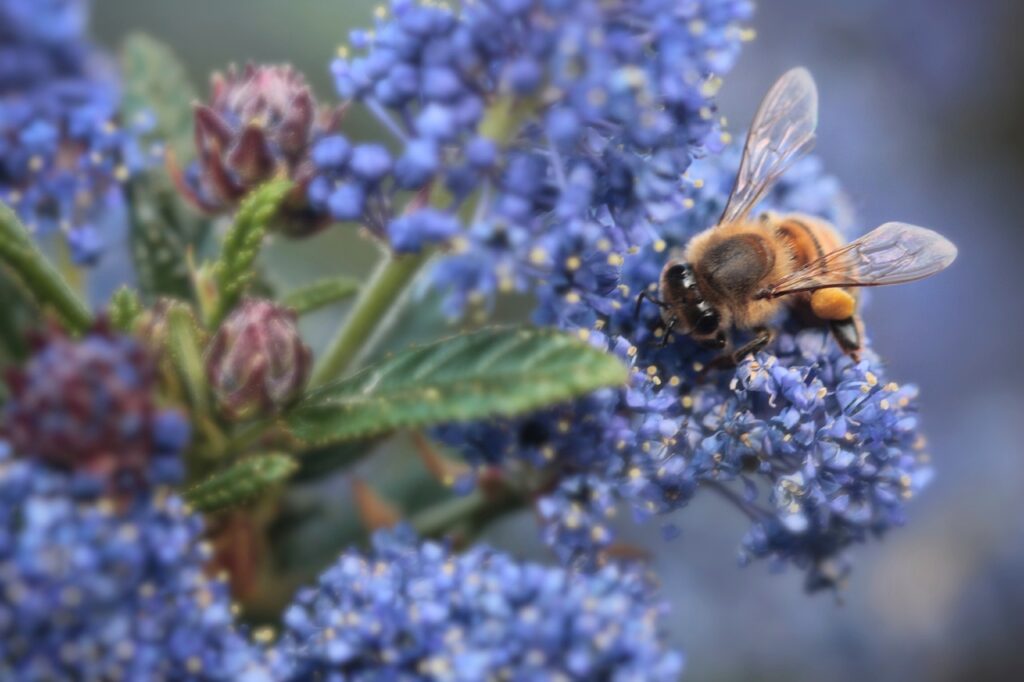Stubborn pest? No, just your friendly neighborhood pollinator! Pollination, in general, produces larger yields and higher-quality fruits and vegetables. This makes pollinators, that is the animals that transfer pollen between plants, crucial to food production. In fact, the estimated value insect pollination has on agricultural crops in just the US is $3.07 billion in total crop value! More specifically, more than 90% of the world’s top 107 crops are visited and supported by bees!
Bees have the unique ability to transport large amounts of pollen due to their hairy bodies and thanks to their reliance on flowers, and their social nature, they are a critical component to healthy ecosystems. Although many animals can act as pollinators, bees are shown to be the most effective in many cases! Reductions in global bee populations are threatening the benefits we gain from pollination. Many bees are endangered but they are still so important.
What makes bees so special?
Bees evolved in tandem with flowering plants! Due to this, they occupy an important ecological role as pollinators for a wide range of flowering plant species. Although bees are not the most diverse group of pollinators, they are the most dominant pollinator group.
Bees are also wholly important to modern agriculture. Bee pollination leads to improved yields, enhanced nutritional value, and improved quality of fruits and vegetables. Their reliable usefulness has created a whole industry dedicated to making sure farms have access to these powerful pollinators. For example, about 150,000 honeybee colonies are rented to US farmers annually. Unfortunately, this can be costly and unavailable in certain areas.
The solution? Supporting native bee populations to reap the agricultural and ecological benefits they provide. By supporting native bee populations, continuous pollination services can be ensured!
What’s the problem then?
Well, more than 40% of bee species are estimated to be vulnerable to extinction. As with many animals, these drastic population declines seem to be mainly human-driven with several factors playing major roles. But the main culprits are habitat loss and pesticide use.
Habitat loss is known to be a major contributing factor to the decline of biodiversity in general so it’s no surprise that it’s the main cause of decline for bee populations. Habitat loss can be seen in the form of habitat degradation, destruction, and fragmentation. Urbanization and pollution lead to these forms of habitat loss making it extremely difficult to support viable bee populations.
Pesticide use also has a myriad of detrimental environmental effects that have widespread impacts. Pesticides are known to contaminate water, soil, and vegetation, and harm many animals including bees. For bees, pesticides can harm them directly and indirectly. Directly, pesticides are known to reduce bee fertility, harm navigation and memory functioning, and shorten lifespans. Indirectly, pesticides can destroy foliage needed for food and shelter. This increases bee mortality and further dwindles population numbers.
We need to save the bees.
A thriving bee community safeguards ecosystem functioning and agricultural yields. To ensure food security and maintain resilience in the face of climate change, we need to protect bee populations. There are three ways we as individuals can make sure we’re supporting bee populations:
Plant a native garden.
Diverse plant communities increase pollination. That’s because plant and pollinator communities support each other! The diversity of a flowering plant community is closely linked to the diversity of pollinating insects. This plant-pollinator relationship fosters ecosystem resilience through the support they give each other.
When pollen is limited due to a lack of plant diversity it causes significant harm to bee reproduction and survival. Therefore, creating areas with healthy native plants is necessary to create thriving pollinator communities. Food for bees is entirely composed of pollen and nectar produced by flowers so having a native flower garden is extremely beneficial, beautiful, and is easier to maintain than non-native gardens. Learn more about what plants are native to your community to help save the bees!
Create bee “safe havens”.
Habitats can be restored and populations can be aided if proper food and nesting resources are available. Due to urbanization, we don’t have much room to restore habitat but bee species richness and pollination function can be restored to levels similar to native habitat as long as proper food and nesting resources are available.
Planting a native garden ensures bees have food, but nesting resources are just as important to help fragmented populations. Nesting resources can be undisturbed bare soil, leaf litter piles, or woody plant material. Having potential nesting areas around native gardens will create a bee “safe haven”, or an area that fosters bees. Designating space for nesting resources will not only improve soil quality in your yard but is also a helpful way you can support native pollinators.
Buy organic.
Limiting pollinator exposure to pesticides cannot be stressed enough. The most surefire way to prevent this exposure is to stop using pesticides in agriculture. But, until we can end pesticide use altogether, the best way we as individuals can limit pesticides is to buy organic. Organic products aren’t treated with pesticides and are loads better for our pollinator buddies. This can range from food to skincare to clothing. Whenever possible, reach for the organic product.
Ways we can help bee populations:
- Plant a native garden.
- Create bee “safe havens”.
- Buy organic.
We have the power to help these important pollinators! By providing food, nesting resources, and eliminating pesticide use we can help native bees thrive and reap the benefits of the quality pollination services they provide. We need to shift our mindset away from degradation and overconsumption and towards a holistic view of our environment to live more sustainably. By viewing bees as the important pollinators they are, we can drive change and create a greener future.

